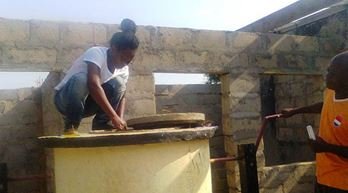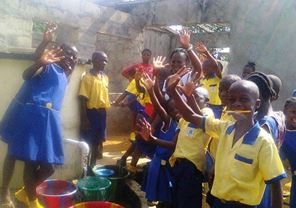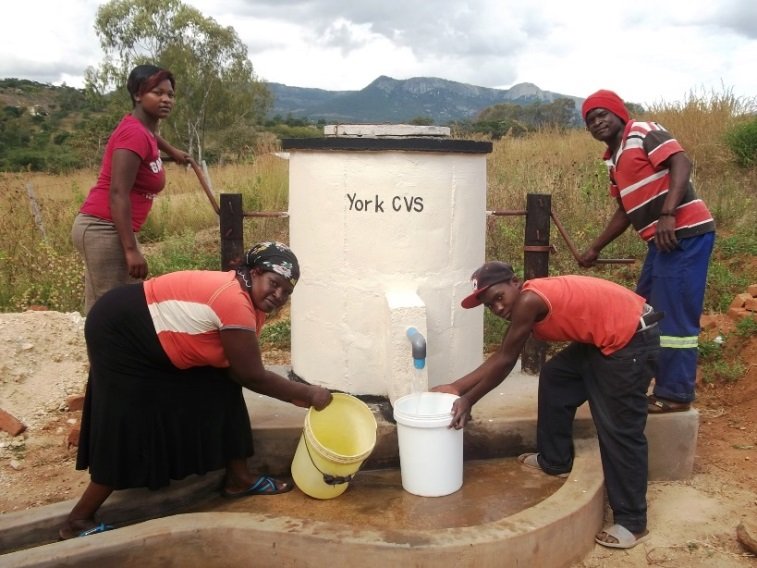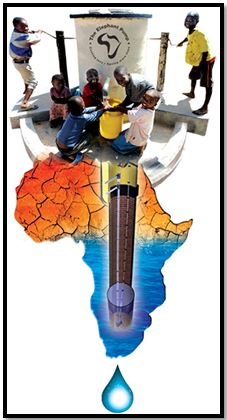
by Fern Shaw | May 20, 2015 | Charity
These are the opening lines that I read after receiving an e-mail from Ian Thorpe of The Africa Trust. I had asked for an update on the progress of the work that the charity carries out throughout countries in Africa. I thought it was high time that we had a more personal perspective on the impact that this life saving and changing work has. I thought it best to leave Cynthia’s narrative in her own words. You’ll see why when you read her story:
‘I am Cynthia M. Brown, a former child soldier. While barely surviving as a refugee at Buduburam camp in Ghana, I had great fear that I would never be accepted again in my home country of Liberia. I thought that reintegration would be a nightmare for me considering all the atrocities committed during the civil war in Liberia.
I met the Chief Executive of the Africa Trust at Buduburam and again in Liberia and after working hard and showing my potential during training, I was given my present job.
Working on Africa Trust funded projects has changed me from living a ghetto life as a drug addict and hopeless person, child prostitute and alcoholic to a responsible life changer, passionate aid worker and instrument of hope and change for poor people in Liberia.
 As Program Officer for logistics and procurement for the Liberia Trust, a local charity implementing projects for the Africa Trust in Liberia, I am responsible to draw up logistical plans, do purchases, deliver materials in the field and keep track of all the possessions of the organisation. I make regular monthly reports to the Country Manager. The Liberia Trust is building Elephant Pumps and Elephant Toilets for poor communities with funding from the Africa Trust.
As Program Officer for logistics and procurement for the Liberia Trust, a local charity implementing projects for the Africa Trust in Liberia, I am responsible to draw up logistical plans, do purchases, deliver materials in the field and keep track of all the possessions of the organisation. I make regular monthly reports to the Country Manager. The Liberia Trust is building Elephant Pumps and Elephant Toilets for poor communities with funding from the Africa Trust.
I help with construction of pumps and toilets as I am now a qualified builder. I also help with monitoring and evaluation, maintenance and facilitating maintenance workshops.
My passion is to help poor community dwellers improve their lives and it helps so much that a beneficiary family named their new born baby girl after me because, according to them, they wanted the child to be like me to grow in my life style. This was my greatest moment of pride, to become a role model instead of a useless person.
Working on the Africa Trust funded projects earned me respect, integrity and trust. My physical and mental capacities have developed greatly as a result of my work. This helped me identify my potentials to change the lives of others.
My family is living a happy life. My two little girls are enjoying my support for them to go to school.’

by Fern Shaw | May 19, 2015 | Charity, water cooler, Water Coolers
‘A wishing well is a term from European folklore to describe wells where it was thought that any spoken wish would be granted. The idea that a wish would be granted came from the idea that water housed deities or had been placed there as a gift from the gods, since water was a source of life and often a scarce commodity.’ ~ Wiki
Here at AquAid, we’ve adapted the concept of the wishing well slightly by ensuring that through the provision of water coolers to our valued customers that this translates into building actual water wells for those less fortunate in Africa.
How it works is that AquAid, who long have a history of supporting sustainable charities, formed a charity called The Africa Trust. This organisation is responsible for building said water wells or, as they are affectionately known, Elephant Pumps. Using donations from a portion of the revenue raised from the sales of water coolers, The Africa Trust have built more than 5 0000 Elephant Pumps throughout Africa, which provide more than 2 million people with safe drinking water. The pump is built (see photograph online in the article) using a modified design based on an ancient Chinese rope pulley system that uses materials that are easy to repair and maintain locally. An Elephant Pump can last for more than 15 years and its design is such that 95% of built pumps continue to operate throughout the continent.
We recently invited York CVS, a Leeds based AquAid customer, to participate in a well building campaign and were delighted when they graciously accepted.
York CVS themselves are all about help and support. Since 1939, York CVS has supported thousands of local charities, voluntary organisations and social enterprises to focus on what they do best – making a difference.
They provide a range of support, training and advice to help organisations set up, flourish and even finish if they feel their work is done.
Ruth Stockdale, Communications and Marketing Adviser at York CVS expressed enthusiasm about the well building campaign, “York CVS is proud to be working with AquAid and is delighted that by providing clean, fresh water here in York, we are able to support others to receive the same benefits in Africa.”
York CVS’ decision to participate in this water pump building campaign means that a rural community in Africa will now have access to safe, clean drinking water.
If you currently have an AquAid water cooler and would like to find out how you can go about sponsoring your very own water well, at no extra cost, please contact us.
Via our website: https://www.aquaidwatercoolers.co.uk/contact
Via e-mail: marie@aquaidwatercoolers.co.uk
Via telephone: 0800 772 3003
If you would like to enquire about purchasing a water cooler, drop us a line or give us a shout at any of the above. We’d love to be able to assist. And you can, of course, be very well (ha) on your way to sponsoring your very own water well.
by Fern Shaw | Oct 7, 2014 | Charity, Water
I believe that you will have gathered by now that I’m a pretty huge proponent of The Africa Trust. I may blather on about it, but please, pick one of numerous reasons, not in the least the fact that thanks an incredibly hard working team, potable water is brought to millions of people in the world and you’ll have really clear idea of why I’m such an enthusiast.
With this in mind, I’m constantly on the look out for discoveries / inventions that can make the world a better place for all involved. Ways that draw from nature, science, ways that are practical, sustainable and more often than not, pure genius.
*Open-Source, Personal Water Desalinator: Italy
Briefly, Eliodomestico is an eco-distiller that uses solar power to make salt water drinkable. Created by Italian designer Gabriele Diamanti, Eliodomestico is an open-source project designed to provide safe drinking water for people in developing countries. Essentially, the device works like an upside-down coffee maker to produce five litres of fresh water every day. Users begin by adding sea water in the morning. Over the course of the day, the heat of the sun causes steam to rise into a water-tight boiler. The steam is then forced down through an expansion nozzle and condenses against the lid of a collection basin. At the end of the day, users can remove the basin, which is full of fresh water and designed for transport on the head.
Eliodomestico is made from widely available materials and requires no electricity or filters; maintenance is simple, Diamanti says.
Gravity-Powered Lamp: United Kingdom
Many of us may take electric lights for granted, but there is a considerable portion of the world—around 1.5 billion people—that lives in poor, remote areas and has to rely on dangerous kerosene alternatives. Currently being funded through an Indiegogo campaign, the GravityLight hopes to change that by offering a cheap lamp that runs on a renewable resource. The device is attached to a weight, which when lifted for a few seconds harnesses enough energy to power the light for 30 minutes. Operating without batteries, the GravityLight contains no deteriorating parts and means owners don’t have to spend money to keep it running.
How fabulous are those? Pretty fabulous I say.
*extracts from an article at Spark
by Fern Shaw | Jun 2, 2014 | Charity, Water
As you know, I tend to blather on a little about water. Especially drinking water. Clean, fresh drinking water in Africa, where millions of people don’t have access to the life giving stuff as we do. It all seems a bit negative, but that isn’t really the case.
I came across these two articles recently.
The first, from The Daily Mail, said:
‘Huge reserves of underground water in some of the driest parts of Africa could provide a buffer against the effects of climate change for years to come, scientists said.
Researchers from the British Geological Survey and University College London have for the first time mapped the aquifers, or groundwater, across the continent and the amount they hold.
‘The largest groundwater volumes are found in the large sedimentary aquifers in the North African countries Libya, Algeria, Egypt and Sudan,’ the scientists said in their paper.’
The other, from The Telegraph, said:
‘Scientists using technology developed to search for oil have discovered a vast underground water reservoir in one of Kenya’s driest regions that if properly managed could supply the country’s needs for close to 70 years.
Researchers from a French-American firm, Radar Technologies International, worked with the Kenyan government and UNESCO to layer satellite, radar and geological maps on top of each other, and then used seismic techniques developed to find oil to identify the reservoir.
It lies in Kenya’s extreme northwest, close to its borders with South Sudan, Ethiopia and Uganda. The area is sparsely populated and prone to conflict over existing scarce resources.’
See, now, this is actually marvellous news, but with this, a word of caution:
“But knowing there’s water there, and then getting it to the surface, are two different things …” Brian McSorley, a water expert at Oxfam in Nairobi, said.
And therein lies the rub. Deep down underground there is potable water – even in the Sahara Desert – but reaching it can be problematic.
That’s why sustainable, practical and cost effective solutions are important. One such solution that has been in operation for a number of years now, addressing this exact problem, can be found through The Africa Trust. A charity started by AquAid and Ian Thorpe. One of the many solutions that The Africa Trust provides is the building of Elephant Pumps throughout disadvantaged communities throughout Africa.
No, they don’t use real elephants. The Elephant Pump is a well based on an ancient Chinese design. The pump has been adapted to make it stronger, more durable and made and maintained using materials that are locally available in remote rural sub-Saharan African communities.

by Fern Shaw | May 19, 2014 | Charity
Country Programmes
Zimbabwe
The bananas for fees project has nearly doubled in size this year with almost one thousand children now benefitting. This was due to a good harvest and the reduced need for inputs compared to the previous two seasons. It is anticipated that further significant growth will be possible next year as school plantations are extended and new sites are identified. This business is clearly profitable although all the profits are being reinvested to achieve impressive growth. There will be very little investment needed for this project now that it has gained momentum.
The dairy programme in Zimbabwe continues to expand with a total of 37 cows. It was established through purchase and distribution of serviced cattle on the understanding that farmers pay back the loans for their cows over a period of 18 months. A dairy association in the Honde Valley manages loan repayment independently. Whenever loan repayments allow for another cow to be bought, this is done on a similar basis so that the dairy herd is continuously expanding. Some additional investment was made to allow for the establishment of a second dairy herd and association in Watsomba. There is a long waiting period for delivery of cattle after payment is made, but the milking shed structures are now in place and a crop of silage has already been grown.
The pump building programme in Zimbabwe is currently operating at full capacity with 10-15 pumps being installed every week. 478 pumps were installed in the last year in Zimbabwe, Tanzania and Liberia, including AquAid pumps and also pumps built with funding from other partners such as Christian Aid and Dorcas Aid. There was a particularly long and heavy rainy season in Zimbabwe, which disturbed construction activities, but such heavy rains mean that aquifers are now fully recharged.
Liberia
In Liberia, we have established a small operation of trained former child soldiers who are building Elephant Pumps and Elephant Toilets. Trials of the new household water filters are proving most encouraging and this could end up being a major programme. Input from micro-biologists and others is helping with modification of the design and water testing protocols. 2014 is the year for the filter to be piloted with roll out from 2015 onwards.
Liberia has been through local disturbances and deadly outbreaks of disease including cholera and the horrifying disease Ebola. It is a country of enormous need, desperate poverty and poor security. Violent crime, especially robbery is commonplace and corruption is the norm. The Africa Trust is planting a seed of hope in that troubled country and gradually the various initiatives are taking root. I am keen on the recycling of plastic waste in Liberia and already we are using waste bottles to make pipes and guttering. There is potential for this to be extended further. A brick-making project was recently funded.
Kenya
In Kenya the 35 business skills trainees who received loans are all doing well, except for one. The motorbike taxi business is slowly growing with no major problems reported on collection of rental fees. We have funded a maize-grinding mill for a group of women living with AIDS. The pioneer group who were so successful in paying back all their loans in full have set up a savings and loans association with some matched loan funding from The Africa Trust.
Malawi
In Malawi, we have a man working full time on business skills training, mentoring and loan collection. There is a growing footprint from this programme as a many businesses succeed and start to provide local employment. An orphanage and home for elderly care has been built near Lilongwe. Some funding has been provided to pay for solar lighting and geysers for the extension to the Dawn Centre for severely disabled children.
Uganda
In Uganda the number of Africa Trust business skills trainees will soon reach 10,000 with a large number of new businesses successfully established as a result. Others have used the skills they learnt to expand and improve existing businesses.
Tanzania
The programme in Tanzania continues to go well with steady growth of the motorbike taxi business and no major management problems with the three water pipelines. One small pipeline problem was resolved in which villagers had blocked an outlet to a cattle trough in order to conserve drinking water. I instructed them to take a separate pipe from source so that the two needs were no longer competing. I again did some survey work with a view to the introduction of the Elephant Pump in the Mara region in the next year or two. A small grocery shop has been established to raise funds for monitoring.
Mozambique
The Mozambique programme is in a holding pattern since the government is insisting on data from an extended pilot period for the Elephant Pump, before expansion can be authorised. We feel that it is worth some patience to keep the authorities on side.

 As Program Officer for logistics and procurement for the Liberia Trust, a local charity implementing projects for the Africa Trust in Liberia, I am responsible to draw up logistical plans, do purchases, deliver materials in the field and keep track of all the possessions of the organisation. I make regular monthly reports to the Country Manager. The Liberia Trust is building Elephant Pumps and Elephant Toilets for poor communities with funding from the Africa Trust.
As Program Officer for logistics and procurement for the Liberia Trust, a local charity implementing projects for the Africa Trust in Liberia, I am responsible to draw up logistical plans, do purchases, deliver materials in the field and keep track of all the possessions of the organisation. I make regular monthly reports to the Country Manager. The Liberia Trust is building Elephant Pumps and Elephant Toilets for poor communities with funding from the Africa Trust.

